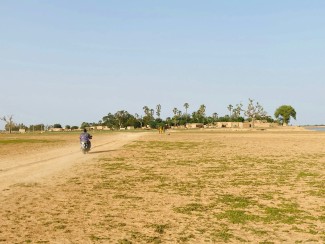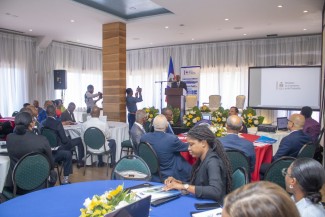As LDCs grapple with ongoing economic fallout from COVID-19, EIF activities have yielded valuable insights for recovery.
As the world continues to tackle the health impacts of COVID-19, trade experts from the Enhanced Integrated Framework (EIF) have been supporting the world’s least developed countries (LDCs) to stem a subsequent economic fallout – by repurposing resources, fast-tracking project implementation, building organisational resilience and finding opportunities amidst the crisis.
“On the African continent, with the exception of Egypt and South Africa, the COVID-19 pandemic hasn’t had the same impact on health and health services as we’ve seen elsewhere. We are, however, alert to the warnings that there is likely to be a spike in cases on the onset of the cold season,” said Griffin Nyirongo, EIF’s Zambia Coordinator at the Ministry of Commerce, Trade and Industry.
“But what we’re facing is much more than a health crisis,” he said.
Stricter border measures, implemented by both Zambia and its neighbours, have led to challenges importing and exporting goods, and a disruption to cross border trade. Imports of food and other commodities have been affected. The tourism sector, especially services catering to foreign travellers, has come to a complete halt. Reduced demand for copper, which is the country’s main export, has led to a decline in government revenue and a rise in inflation rates. Amidst ongoing uncertainty, foreign investors are considering transferring their portfolios out of the country.
The challenges in Zambia are being seen in other LDCs, said Annette Ssemuwemba, EIF’s Deputy Director.
“Many of the LDCs greatly depend on sectors that have been most adversely affected by COVID-19. Some sectors, such as manufacturing, are beginning to bounce back as restrictions ease, but other sectors such as tourism are going to take a long time to recover,” she said.
“There are also huge social impacts, and these of course affect trade. If people are not healthy, if parents are struggling to just keep their homes running because they’re out of work, micro and small businesses are closing, all these impacts very much on trade and the economy.”
Repurposing resources
The EIF, which is hosted by the World Trade Organisation in Geneva, has been working with LDCs since 2007 to help them overcome trade challenges and better integrate in global markets. EIF resources are directed at two main areas –strengthening trade policies and institutions, and expanding productive capacity in strategic value chains.
“We work closely with all countries and believe that in order for LDC development to be sustainable, the countries should be empowered to lead improvements in their trading environment. Most of our projects are co-financed by the LDCs themselves. This kind of approach is unique in the international development community but it guarantees that LDCs fully own their trade agenda,” said Ssemuwemba.
In Zambia, EIF is training the next generation of trade negotiators, building the capacity of cooperatives to contribute to international trade, enhancing trade in honey, connecting women entrepreneurs to global markets, strengthening systems for certifying plant health prior to export, and supporting negotiations with neighbouring countries to establish a one-stop border post. It has also conducted sector trade surveys to support policy development.
This work has largely relied on face-to-face interactions. But COVID-19 lockdown restrictions meant the team had to pivot.
“When COVID-19 first hit, our first priority at the Geneva headquarters was to make sure that all the country teams were safe, and that they had all the tools they needed to be able to work from home. Where necessary, we repurposed resources to enable them to obtain necessities like internet connectivity, videoconferencing tools or an extra laptop,” Ssemuwemba said.
The EIF team then conducted a risk assessment for each country, enabling a tailored approach.
“Many of the countries told us that project implementation was still possible, however they needed to adapt timelines and methods of delivery to make sure that different participants would be able to engage virtually.”
“We’ve seen lots of changes to work plans, to budgets, to mechanisms of operation, and we’ve done our best to support these processes,” she said.
“But it’s been a challenge as it has been quite labour intensive to design different approaches for each of the 51 countries we work with. You just can’t roll out a guideline as different countries have been affected differently by the pandemic and so have different abilities.”
In Zambia, it’s meant that stakeholder engagement and training activities have had to be put on hold, said Nyirongo.
“It’s not just as simple as taking meetings online. Some of our stakeholders are not abreast with videoconferencing, and many of our meetings run for several days, which would be very difficult for people to do online,” he said.
“We are looking into ways around this, for example smaller groups could do the bulk of the work together, and then present back to a large group where possible via videoconference for discussion and feedback.”
Fast-tracking implementation
Another challenge for project implementation at the country level is the capacity of government to co-finance implementation of some activities; government capacity has been affected as a result of reduced revenue as well as diversion of resources to address COVID-19 response measures, Nyirongo said.
This, however, has enabled the EIF Zambia team to instead focus on laying the groundwork for projects, such as preparing concept notes and getting bureaucratic approvals in the system.
“Now that these activities are approved, once restrictions are eased we hope to be able to fast-track implementation,” Nyirongo said.
"But we are mindful that it’s a fast changing situation, requiring us to continuously assess the risk posed by the pandemic on project implementation. This may mean multiple reviews of work plans and budgets over the coming months.”
At a strategic level, EIF’s Geneva headquarters has identified the need for COVID-19 to be included in future impact assessments, such as Diagnostic Trade Integration Studies (DTIS), or in understanding the effects on LDC graduation pathways. They’re also looking into how to enhance support to the most vulnerable communities such as women, youth and small- and medium-sized businesses.
“We know women and youth are suffering more repercussions from COVID-19 and so we’re looking at how to expand our work to cover more small and medium enterprises, which are often where women and youth work. This might mean that country teams need to adjust their current activities ensuring a focus on smaller or micro enterprises,” Ssemuwemba said.
EIF’s expertise in convening cross-institutional dialogue is also coming in handy, Ssemuwemba said.
“Bringing together the ministry of trade to develop joint strategies with the ministry of health, the ministry of agriculture and leverage each other’s resources is critical at this time. Most resources have been directed towards health, and we therefore need to optimize available resources to obtain the best value under the circumstances,” she said.
One such way of increasing country resources at this time is to better promote foreign direct investment.
“We have been working with organisations such as the World Association of Investment Promotion Agencies [WAIPA] to identify ways to better support LDCs to adapt their investment strategies, or formulate capacity building programs, so that LDCs can engage quickly with investors,” Ssemuwemba said.
Building organisational resilience
One of EIF’s main lessons from COVID-19 is the need for organisational resilience, Ssemuwemba said.
“We can’t know which disaster will strike next, but it’s important that we’re more prepared than we were for COVID-19. Many organisations didn’t really have a business continuity plan and that slowed the response. While we don’t know what form future disasters will take, we should always have a plan at hand to implement quickly,” she said.
She also points to the need for organisations to be continually reflective.
“We are seeking to check in every six months and assess how do we think we’d be able to react if a disaster hit – how prepared would we be to be able to continue operations, how prepared are our stakeholders? This kind of conversation allows us to be prepared for any situation that could arise.”
As a step towards better preparedness, EIF is integrating virtual ways of working into its day-to-day operations.
“While virtual tools can never replace face-to face-field visits, we have learnt that they do work well and also allow the organisation to continue operations in the event of a disaster,” Ssemuwemba said.
Opportunity in crisis
The pandemic has also been a reminder that in every challenge there is opportunity.
“Because of this slow movement of imported goods, there’s been less competition for Zambian manufacturers so there are opportunities for local manufacturers to meet the supply gap presented. As a result, we’ve seen more Zambian goods coming into the stores,” Nyirongo said.
“Also as the government has removed duties on the import of ethanol, there has been an opportunity for local manufacture of disinfectants and hand sanitisers.”
While lockdown restrictions begin to ease across many LDCs, it’s still not business as usual, and it may not be for some time, Nyirongo said.
“We have been allowed to conduct policy-related stakeholder consultations but we’re operating in a different atmosphere – there must be less than 50 people, there should be the appropriate spacing, there should be the wearing of masks, hand sanitation, sanitisers and wash basins for hands,” he said.
As we start to resume our work in the rural areas, we need to be very mindful of the different perceptions of COVID-19 there – as there have been very fewer cases, COVID-19 is seen as an urban pandemic. How this will affect trust building in relationships remains to be seen.”
Header image - ©Simon Hess/EIF
If you would like to reuse any material published here, please let us know by sending an email to EIF Communications: eifcommunications@wto.org.



